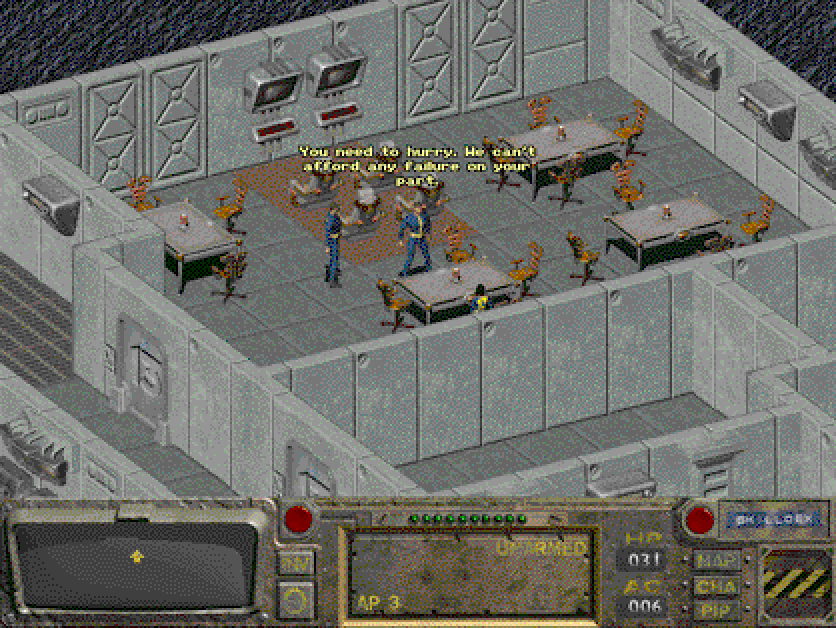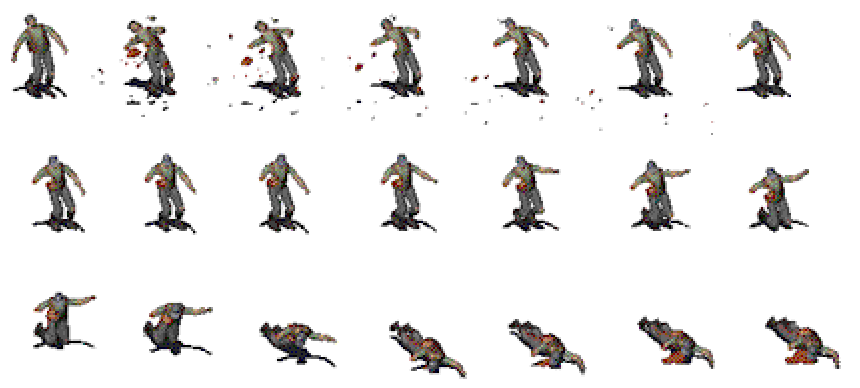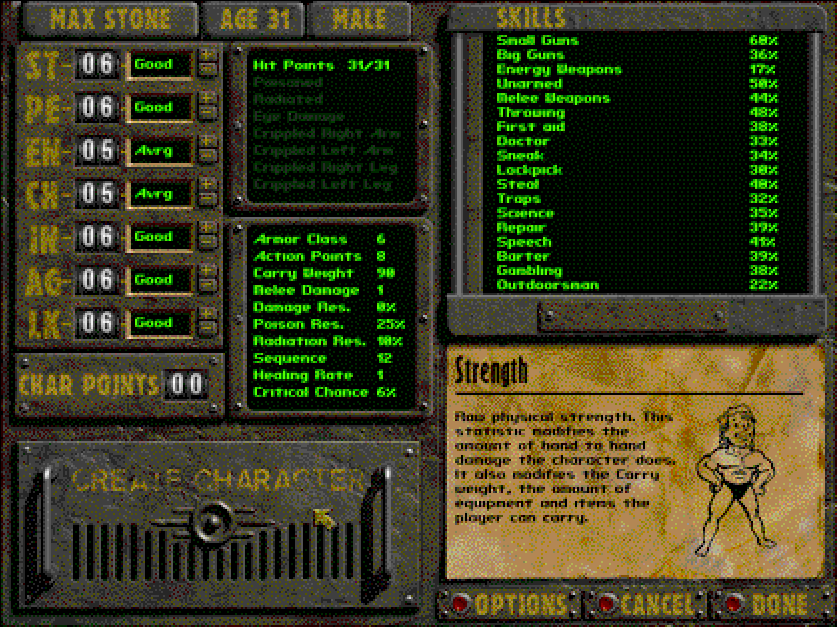The words ‘Sci-Fi RPG’ will likely elicit wistful sighs from most Mac gamers. On the PC side, Sci-Fi pickings are slim in a genre dominated by fantasy—on the Mac side, save a few notable exceptions, they’re nonexistent.
Enter Fallout, the work of veteran RPG programmer Tim Cain and a team of over twenty coders, artists, and game designers. Set in a post-nuclear wasteland reminiscent of Mad Max movies and RPG classics like Wastelands, this epic adventure is set to take the gaming world by storm when it hits shelves later this year. A playable demo has been released to the Net, and IMG recently received a sneak peek at the evolving world that makes up the full game. Although details are subject to change as it nears completion, Fallout looks to be a groundbreaking release for Mac and PC gamers alike.
Setting
Fallout’s setting is a quirky mix of pop culture and post apocalyptic mayhem—the new millennium is marked by war, nuclear holocaust, and a bewildering annexation of Canada. Your parents were two of the lucky ones who bought spots in a state of- the-art fallout protection vault. Locked away from the war in their underground home, they and the other residents of Vault Thirteen have lived in isolation and relative safety for years. If that sounds a bit too good to be true, it is—the water refinement control chip, after decades of faithful service, has given up the ghost, leaving the vault and its inhabitants with a scant few months until their clean water runs out. As fate would have it, you’re the lucky one selected to venture out into the great unknown to find a replacement chip.
Fallout’s visuals are a deliciously gritty, rusted version of 1950’s Sci-Fi gone bad. Classic refrigerators are used as ammunition vaults, tail-finned cars have rusted out and been used to replace destroyed walls. Much attention has been paid to detail, and the game does an amazing job of creating a grim, moody atmosphere.

Though the recently released Fallout demo offers a taste of the game play and gorgeous artwork, it gives only a hint of the game’s huge world and provides only a single prefabricated character. The full game, in the grand tradition of good RPGs, will offer complete control over the character creation process. Skills, abilities, inherent gifts can all be tweaked to create the perfect character.
This creation process deals with a surprising number of non combat traits and skills, affecting far more than talents with particular weapons. Obvious stats like strength, perception, agility, and intelligence are all modeled. In addition, players can finesse their resistance to drugs, preference for dark lighting, and even such intangibles as gambler’s luck. Rather than acting as isolated ‘traits,’ these qualities all interact with each other. Your sneaking skills will be even better, for example, if you’ve opted for both agility and high perception.
Fallout’s world is huge. The massive desert expanse is littered with half-destroyed cities, once-inhabited vaults, and other clinging remnants of humanity. It’s in these environments that the work that went into the Fallout engine is apparent. Hundreds of megabytes of art work, sounds, original music, and detailed maps make every location a unique experience. One may be a dust-caked outpost while another is the bombed-out remains of an urban sprawl. Underground caves, subways, and other settings are found throughout—populated with innumerable friends, foes, and unknowns.

The game provides a straightforward and convenient interface for traveling long distances between cities, vaults, and towns. Select a destination, and a mapping device traces the path to your goal as a digital clock charts the passage of time. If you’re interrupted along the way by a band of merchants, a nest of mutant desert scorpions, or some other distraction, it brings you from the map view to your immediate surroundings to respond to the danger or opportunity.
Interaction with other characters in the game goes far deeper than helping your friends and shooting your foes. Complex interaction with other characters includes detailed conversations plus bartering and pocket-picking. Your comments, personality traits, clothes, and even the equipment you’re carrying all affect other characters’ reactions to you.
Wandering into a small town and striking up a conversation with the local gossip may reveal that the daughter of the town’s leader was kidnaped days ago by desert bandits. If you rescue her, they might be willing to aid you in your quest for the water purification chip. Additional sub-plots are presented in these encounters, weaving into a larger story that eclipses even your mission to save the Vault.
Creation
Fallout’s complex character creation process and rich NPC interaction shines in these side adventures. Almost every adventure and mini-plot has multiple solutions, allowing different types of characters to solve them creatively. In the example above, you might try blasting your way through to rescue the damsel in distress, sneaking in under cover of night, or even wheeling-and-dealing your way past a guard with smooth words. Whether you can pull off these tricks depends, of course, on the decisions you make when creating your character and the skills you build up throughout the game.

The emphasis on developing non-combat aspects of characters does not, of course, mean that Fallout lacks visceral, in-your- face bloodshed. Combat is turn-based with character traits coming into play as you and any others in your party take on enemies. Weapons run the gamut: hunting rifles, throwing knives, chain guns, brass knuckles, plasma rifles, grenade launchers, and a plethora of handguns. Gang members, desert raiders, giant underground moles, baton-wielding mechanics, and crazed farm animals all present themselves as opponents in your explorations.
Graphics
Each weapon, piece of armor, object, etc. has its own graphics and combat animations. A desert raider shouldering a rocket launcher looks quite different from a leather-clad gang member swinging a spear. A character holding a knife will idly toss it into the air and catch it when not fighting, and ogre-like mutants scratch and grunt convincingly. Death receives just as much attention to detail. Direct fire from a chain gun often leaves pieces of an opponent scattered over a wide area.
Perhaps the most controversial aspect of Fallout is the lack of network play. After much consideration, the development team felt that the trade-offs in game play would detract from the richness of the environment. Interaction with NPCs, browsing of recorded video clips, turn-based combat, and a number of other integral elements of the game would be difficult to resolve with the real time nature of net play.
Fallout is an exciting, innovative role-playing game set to break new ground when it hits the streets later this year. Look for more news in IMG as Fallout nears completion, and check out the playable demo available on this month’s CD.